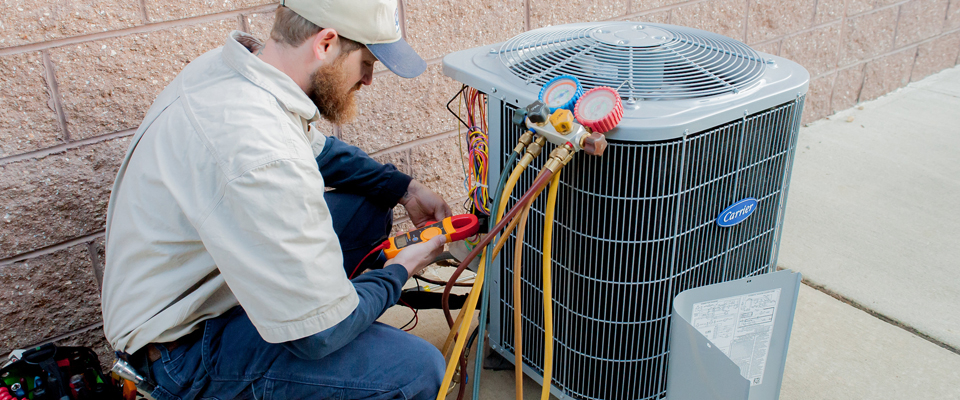Trust DMAKS HVAC for Top-Notch Heating and Cooling Solutions.
Trust DMAKS HVAC for Top-Notch Heating and Cooling Solutions.
Blog Article
How to Choose the Right HVAC System for Your Requirements
Choosing the ideal HVAC system is a crucial decision that requires cautious factor to consider of different aspects. The myriad of system types available can complicate this process, leading one to wonder which path ultimately leads to optimum convenience and performance.
Evaluate Your Home Size
Evaluating your home dimension is a crucial very first action in choosing the appropriate HVAC system. An A/c system that is also small will certainly struggle to keep comfortable temperatures, leading to boosted energy usage and use on the unit.
To precisely analyze your home dimension, gauge the square video of each area, taking into consideration aspects such as ceiling height and the layout. Furthermore, think about the insulation high quality and the number of home windows, as these components influence thermal efficiency. Homes with open flooring strategies might need different system configurations compared to those with many separated rooms.
Using the Guidebook J tons estimation method can give a much more specific estimate of your HVAC needs. This method accounts for various variables, consisting of neighborhood climate, solar gain, and tenancy patterns. By meticulously reviewing these aspects, you can ensure that your chosen HVAC system is appropriately sized, causing improved convenience, power efficiency, and long life of the tools.
Determine Your Spending Plan
Determining your budget is a crucial action in the a/c system option procedure, as it sets the parameters for your options - DMAKS HVAC. A HVAC system is a considerable financial investment, and recognizing your financial limitations will aid limit options that fit within your ways
Begin by evaluating not just the initial acquisition cost yet also setup costs, which can vary considerably relying on the intricacy of the job. Think about continuous costs such as maintenance, repairs, and energy intake. A system might show up budget-friendly originally yet can bring about greater costs gradually if it is much less effective.
It is a good idea to assign a backup fund for unforeseen expenses that may arise throughout installment or initial system adjustments (DMAKS HVAC). Furthermore, check out funding alternatives or rebates that might be available, as these can reduce the problem of ahead of time expenses
Eventually, having a clear budget plan permits you to engage with HVAC specialists better, guaranteeing you receive customized advice that lines up with your monetary goals and home needs. By being attentive concerning your spending plan, you can make educated decisions that improve comfort without jeopardizing economic stability.
Evaluate Power Effectiveness
Power effectiveness plays an important duty in the general efficiency and cost-effectiveness of your a/c system. When selecting a system, it is necessary to consider its energy efficiency ratings, as these numbers straight impact your energy costs and ecological impact. Try to find systems with a high Seasonal Power Efficiency Proportion (SEER) for cooling and a high Annual Gas Utilization Performance (AFUE) rating for home heating. Higher rankings suggest greater effectiveness, meaning even more comfort for much less power intake.
Furthermore, take into consideration the Energy Star qualification, which represents that the system satisfies rigid performance standards established by the Environmental Security Firm. Buying an Energy Star-rated cooling and heating system can bring about substantial financial savings with time, particularly in locations with severe temperature changes.
An additional variable to evaluate is the system's dimension and capability. A large or small unit can cause inefficiency and enhanced energy expenses. DMAKS HVAC. Correct sizing, often identified via a Manual J load computation, ensures that the system operates at optimal effectiveness


Consider Environment and Environment
When picking an a/c system, it is important to consider the regional climate and environmental problems, as these elements significantly influence the system's performance and efficiency. Different regions experience differing temperature level extremes, moisture levels, and seasonal modifications, all of which influence heating and cooling down demands.

In addition, regional environmental aspects, such as air top quality and potential allergens, ought to inform your choice. Solutions equipped with sophisticated filtering innovations can assist minimize contaminants and offer cleaner air. Additionally, think about the power sources readily available in your location-- some heating and cooling systems are a lot more efficient when powered by all-natural gas or renewable resource sources.
Ultimately, aligning your a/c system option with your neighborhood climate and environmental considerations like this will bring about enhanced convenience, boosted performance, and lower power costs.
Explore System Types and Functions
As homeowners seek to optimize convenience and effectiveness, exploring the various kinds of cooling and heating systems and their special features ends up being necessary. The main sorts of heating and cooling systems include main air conditioning, heatpump, ductless mini-split systems, and furnaces. Each system provides distinctive advantages customized to different demands and choices.
Central air conditioning systems supply uniform cooling throughout you can try these out a home, making them suitable for larger areas. Warmth pumps work as both home heating and cooling down options, utilizing electrical power to transfer warmth, which can cause reduced energy expenses. Ductless mini-split systems are ending up being significantly preferred because of their adaptability and simplicity of installment, enabling house owners to manage the temperature in specific rooms without substantial ductwork.

Conclusion
In final thought, choosing the proper a/c system requires careful consideration of numerous variables, including home size, spending plan restraints, power effectiveness, neighborhood environment, and readily available system types. A thorough evaluation of these components makes certain optimum comfort and cost-effectiveness. By complying see post with a structured strategy, house owners can make educated choices that straighten with their particular demands and preferences, inevitably leading to improved indoor air high quality and energy savings.
Report this page